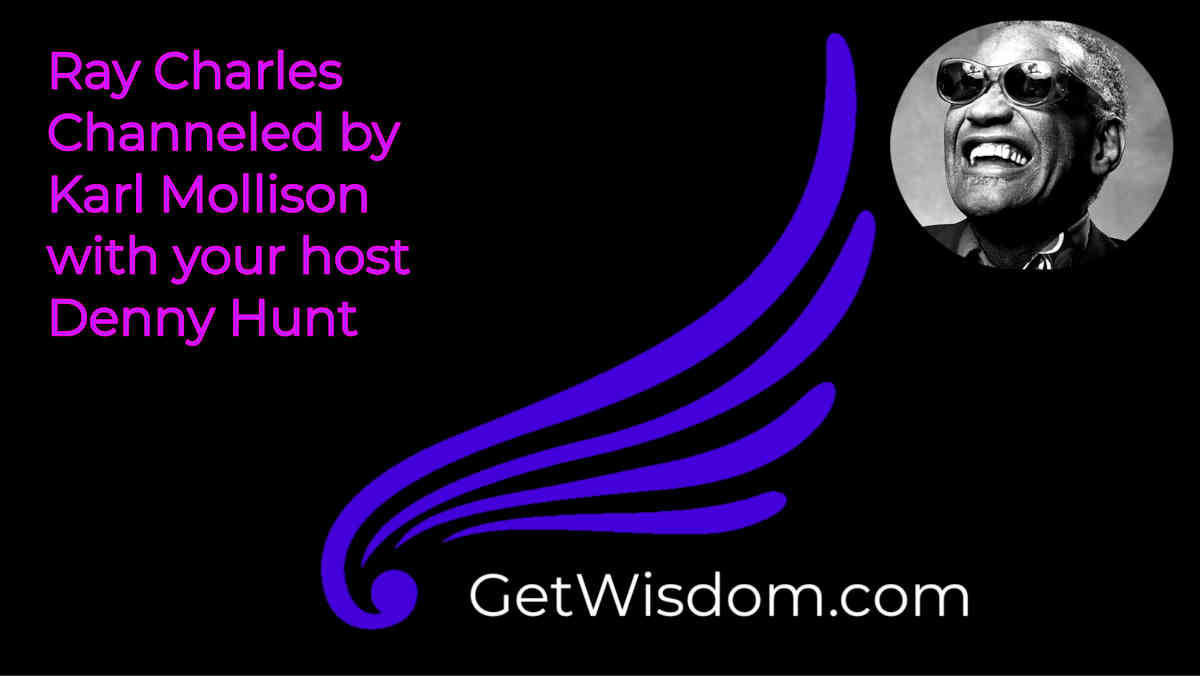
Ray Charles Channeled by Karl Mollison 23Aug2020
From https://en.wikipedia.org/wiki/Ray_Charles w/edits.
Ray Charles Robinson September 23, 1930 – June 10, 2004 was an American singer, songwriter, pianist, and composer. Among friends and fellow musicians he preferred being called “Brother Ray.” He was often referred to as “The Genius.”
Charles was blinded during childhood due to glaucoma.
He witnessed the drowning of his younger brother and was separated from his mother and absentee father which caused further trauma in his younger years and perhaps throughout his life.
Charles pioneered the soul music genre during the 1950s by combining blues, jazz, rhythm and blues, and gospel styles into the music he recorded for Atlantic. He contributed to the integration of country music, rhythm and blues, and pop music during the 1960s with his crossover success on ABC Records, notably with his two Modern Sounds albums. While he was with ABC, Charles became one of the first black musicians to be granted artistic control by a mainstream record company.
Charles’ 1960 hit “Georgia On My Mind” was the first of his three career No. 1 hits on the Billboard Hot 100. His 1962 album, Modern Sounds In Country And Western Music, became his first album to top the Billboard 200. Charles had multiple singles reach the Top 40 on various Billboard charts: 44 on the US R&B singles chart, 11 on the Hot 100 singles chart, 2 on the Hot Country singles charts.
Charles cited Nat King Cole as a primary influence, but his music was also influenced by Louis Jordan and Charles Brown & the Grand Ole Opry. He had a lifelong friendship and occasional partnership with Quincy Jones.
Charles is a 17-time Grammy Award winner. He was honored with the Grammy Lifetime Achievement Award in 1987; 10 of his recordings have been inducted into the Grammy Hall of Fame. In 2002, Rolling Stone ranked Charles No. 10 on their list of the “100 Greatest Artists of All Time,” and No. 2 on their list of the “100 Greatest Singers of All Time” in 2008.
On Halloween 1964, Charles was arrested for possession of heroin at Boston’s Logan Airport. He decided to quit heroin and entered St. Francis Hospital in Lynwood, California, where he endured four days of cold turkey withdrawal. When Charles returned to court, he received a five-year suspended sentence, four years of probation, and a fine of $10,000.
Charles responded to the saga of his drug use and reform with the songs “I Don’t Need No Doctor,” “Let’s Go Get Stoned,” and the release of Crying Time, his first album since having kicked his heroin addiction in 1966.
Charles was married twice. His first marriage was less than a year, his second 22 years. Throughout his life Charles had many relationships with women with whom he fathered a dozen children.
Charles held a family luncheon for his twelve children in 2002, ten of whom attended. He told them he was mortally ill and $500,000 had been placed in trusts for each of the children to be paid out over the next five years.
In 2003, Charles had successful hip replacement surgery and was planning to go back on tour, until he began suffering from other ailments. He died at his home in Beverly Hills, California of complications resulting from liver failure, on June 10, 2004, at the age of 73.
His final album, Genius Loves Company, released two months after his death, consists of duets with admirers and contemporaries: B. B. King, Van Morrison, Willie Nelson, James Taylor, Gladys Knight, Michael McDonald, Natalie Cole, Elton John, Bonnie Raitt, Diana Krall, Norah Jones and Johnny Mathis. The album won eight Grammy Awards.
Ray Charles as a light being now has the spiritual enlightenment needed to understand the karmic causes of his blindness, and the divine source of his talent.
